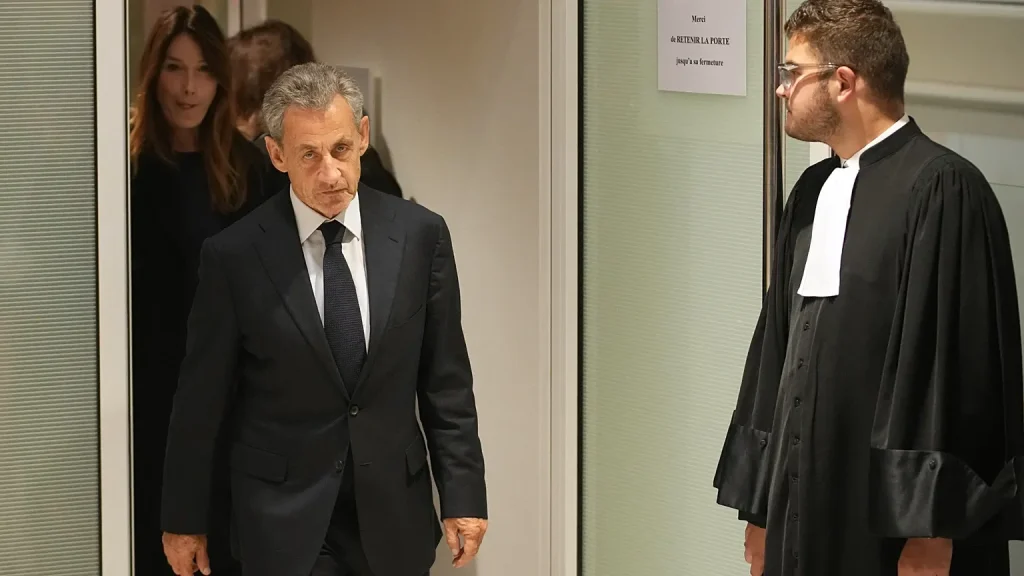On October 21, 2025, former French President Nicolas Sarkozy arrived at La Santé prison in Paris to start a five-year sentence. Convicted in September for illegally funding his 2007 election campaign with Libyan money, Sarkozy, 70, becomes the first modern French leader to face imprisonment.
Accompanied by his wife, Carla Bruni-Sarkozy, he left his upscale Paris home, defiantly proclaiming his innocence.
In a social media post en route to the facility, Sarkozy declared, “They’re locking up an innocent man.” He challenges both the conviction and the rare judicial decision to detain him during his appeal, a move the Paris court justified due to the “severe impact on public trust” caused by his actions.
Public and Legal Reaction
Sarkozy’s journey from the Élysée Palace to a prison cell has gripped France. Hundreds of supporters gathered near his home, chanting his name and singing La Marseillaise in solidarity.
The conservative leader, who served as president from 2007 to 2012, remains a polarizing figure, with loyalists viewing him as a victim of political targeting.
His legal team, led by Christophe Ingrain, condemned the detention on French television, stating it fuels Sarkozy’s resolve to clear his name. “This only strengthens his fight to prove his innocence,” Ingrain said. For safety, Sarkozy will be held in solitary confinement, isolated from other inmates in the notorious prison.
Defiance Amid Confinement
Sarkozy remains unbowed, vowing to fight the conviction to the end. In an interview with a French Sunday paper, he stated, “I’m not scared of prison. I’ll walk in with my head high and keep battling.”
His lawyers have already filed for parole, aiming to secure his release swiftly. Ingrain revealed Sarkozy plans to document his prison experience in a book, turning adversity into a platform for his narrative.
The former president’s defiance has sparked debates across France, with some praising his resilience and others questioning the integrity of the judicial process.
His case highlights the complexities of holding high-profile figures accountable in a nation proud of its democratic traditions.
Context of the Conviction
The September ruling found Sarkozy guilty of orchestrating illegal campaign financing, allegedly accepting funds from Libya to bolster his 2007 presidential bid. The scandal, long under investigation, has tarnished his legacy, though he denies wrongdoing.
The court’s decision to jail him pending appeal an unusual step underscores the gravity of the charges, which prosecutors argue undermined electoral fairness.
Sarkozy’s conviction marks a historic moment, as no former French president in modern times has faced such a fate. His legal battles, including prior charges related to corruption, have kept him in the spotlight since leaving office.
National Reflection
The sight of Sarkozy entering La Santé has stirred emotions, from outrage among supporters to calls for justice among critics.
Social media buzzes with hashtags like #FreeSarkozy, while others demand accountability for political elites. The case raises questions about campaign finance laws and judicial impartiality in France.
As Sarkozy begins his sentence, his supporters remain vocal, organizing vigils and rallies. His legal team’s push for parole signals a broader fight to overturn the conviction. France watches closely, grappling with the balance between punishing misconduct and respecting a former leader’s legacy.
Looking Ahead
Sarkozy’s imprisonment is a turning point, both for him and for France’s political landscape. His planned book and ongoing legal efforts suggest he will remain a prominent voice, even from behind bars.
The nation awaits the outcome of his appeal, which could reshape perceptions of his presidency and the judicial system.
For now, Sarkozy’s resolve and the public’s divided response underscore the stakes of this historic moment. As France reflects on justice and leadership, the former president’s journey through adversity will likely fuel debates for years to come.
READ MORE: Morocco’s GenZ Protests Resume in Rabat, Demanding Reforms




















